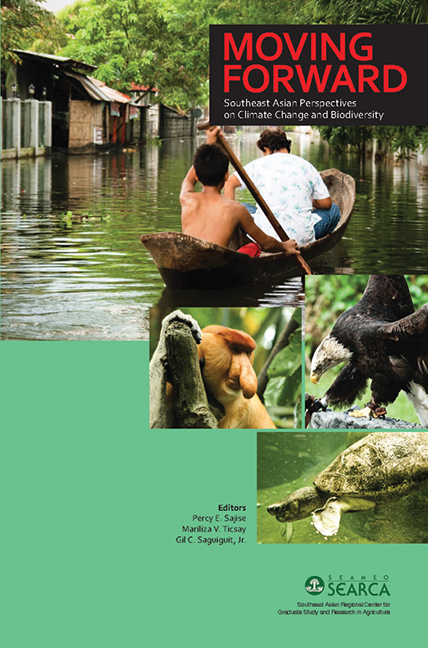1 - Exploring the Link between Climate Change and Biodiversity
from INTRODUCTION
Published online by Cambridge University Press: 21 October 2015
Summary
BIODIVERSITY LOSS AND CLIMATE CHANGE
The Convention on Biological Diversity (CBD) Secretariat and the Global Environment Facility (GEF) Small Grants Programme share the belief that the poor and vulnerable communities will bear the worst of biodiversity loss and climate change impacts. These same poor and vulnerable communities are the critical stakeholders that hold the key to making the efforts in biodiversity conservation and climate change mitigation and adaptation successful.
All of us are joined together. We must thus work together given the dire consequences of the double impacts of biodiversity loss and global warming. A word that comes to mind is ‘extinction.’ This word appropriately links biodiversity loss and global warming.
In the past, biodiversity loss is like ‘dying with a whimper’ as species are lost and people do not even know what they had lost. The concern was also on specific areas where biodiversity loss is relatively fast. We now call these areas as ‘biodiversity hotspots.’
Global warming, however, drastically changes the equation of extinction. Extinction will not only be just for the rare and endangered species but also for global biodiversity. The ecological feedback goes full circle. Humans, who are most responsible for biodiversity loss and global warming, are likewise directly endangered. There is still confidence that humans will adapt and survive. But there is the definite risk of becoming poorer. Those who are already poor are at risk of further declining to the worst of conditions.
FACING THE IMPACTS OF CLIMATE CHANGE
According to the Intergovernmental Panel on Climate Change (IPCC), if temperature increase exceeds by 1.5-2 °C, 20-30 per cent of plant and animal species are at risk of extinction. This condition is especially relevant for those species that are already at risk due to low populations, restricted patchy habitats, and limited climatic ranges. Overall, as many as 1 M species may face increased threats of extinction because of climate change.
Climate change has already affected the functioning, appearance, composition, and structure of ecosystems.
- Type
- Chapter
- Information
- Moving ForwardSoutheast Asian Perspectives on Climate Change and Biodiversity, pp. 3 - 8Publisher: ISEAS–Yusof Ishak InstitutePrint publication year: 2010



